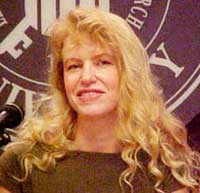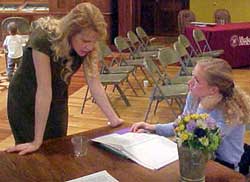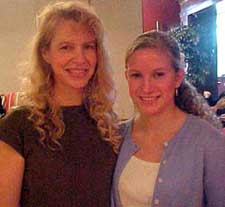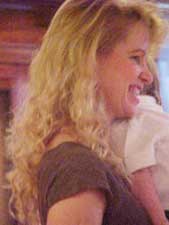Major Works
- The Persia Cafe (2001) novel
- Even Mississippi (1989) memoir
A Biography of Melany Neilson
by Julia Cathcart (SHS) 2001
Melany Neilson was born in Moses Lake, Washington, on December 1, 1958. She was the first of Ed Tye and Rosemary Neilsons’ five children. The three Neilsons moved to Lexington, Mississippi, their family’s home, in 1959 (1 Neilson). The farm she grew up on was near Ebenezer, Mississippi (Stennis).
Neilson attended the first three years of elementary school at Benton Public School. An Emily Dickinson poem that her fourth grade teacher, Ms. Maybelle O’Reilly, read to the class stimulated her desire to write. Neilson’s first memory of wanting to write dates back to the moment when she heard the line “My eyes are the color of sherry left over night.” She “gasped…the other children laughed at me…I did not know whether I could write, but I realized that I wanted to write…I knew at that moment that I wished I could make others see what I had seen when that line was read,” says Melany Neilson. Neilson graduated from Central Holmes High School in 1977, and she continued her education at the University of Mississippi. Both her Bachelors of Art degree in English, in 1979, and her Masters of Art degree in journalism, in 1986, were earned from the University of Mississippi (3 Neilson).
In 1979, Melany Neilson met her then future husband, Fred Slabach, at a party on the Ole Miss school campus. They were joined in holy matrimony on May 18, 1985 (2 Neilson). Even Mississippi, her first book and a memoir of her work with Robert Clark, the Democratic nominee for U. S. Senate in 1982 and 1984., was published in 1989. This book received many honors including the Lillian Smith Award, the Mississippi Authors Award, the Gustavas Myers Outstanding Book on Human Rights, as well as a nomination for a Pulitzer Prize (Stennis). On July 25, 1998, Melany and Fred Slabach celebrated the birth of their twin sons (1 Neilson). After her father’s death, Neilson started writing her current book about her father’s life. However, she was struggling with her father’s story at first, so she put it down until “the time was right” (3 Neilson). The Persia Café, published in 2001, is Melany Neilson’s first novel (Doubleday Direct Inc.). At the time of the interview below, Neilson lived in California, but since 2011, Neilson and her husband Frederick G. Slabach (president of Texas Wesleyan University in Fort Worth) , and three children live in Texas.
Timeline
- December 1, 1958 – Melany Neilson was born in Moses Lake, Washington.
- 1959 – Melany, Rosemary, and Ed Tye Neilson move to Lexington, Mississippi.
- 1968 – Neilson realized her passion for writing in Ms. Maybelle O’Reilly’s fourth grade class.
- 1977 – She graduated from Central Holmes High School.
- 1979 – Neilson graduated from the University of Mississippi with a Bachelor’s in English.
- 1979 – She met her future husband, Fred Slabach, at a party at Ole Miss.
- May 18, 1985 – Fred Slabach and Melany Neilson were married.
- 1986 – She finished graduate school with a Master’s Degree in Journalism.
- 1989 – She published Even Mississippi.
- July 25, 1998 – Neilson had twin sons.
- 1998 – Neilson started work on a book about her father.
- 2001 – She published The Persia Café.
- March 8, 2001 – Julia Cathcart interviewed Melany Neilson about her new book The Persia Cafe.
Reviews
Review of The Persia Cafe
by Julia Cathcart (SHS) 2001
The Persia Café by Melany Neilson is about a young white woman’s firsthand experience of racial persecution in 1960s rural Mississippi. Fannie Leary stumbles upon the truth behind the murder of a local black boy who had had an illicit affair with a white girl. Fannie’s world turns upside down when she gains the fortitude to come out with her exclusive information.
Fannie Price has lived in Persia, Mississippi, her entire life. She is an only child raised by her hardworking single mother. Fannie grows up in the security of a small town environment. Her childhood was relatively normal, but unlike other little girls, cooking had always been Fannie’s passion. Fannie’s view of the world is very limited in Persia; the black people were simply that, black. They are tolerated, but they never deserve quite the same level of respect that white people receive. In high school, Fannie began waitressing at her Aunt Eugenia’s Persia Café. After graduation, she starts working full time at the café. Eventually, she marries her childhood friend and only lover, Will Leary. This is the same quiet, but internally wild, boy who had accidentally killed Fannie’s uncle. These are not Fannie’s original plans: she believes that attending culinary school would be her ticket out of Persia to a better life. She dreams of becoming a chef in Paris, but contents herself with working at the café until something happens.
Life is monotonous for Fannie until she receives an invitation to participate in The Southern Pecan Growers Association recipe contest. She started cooking incessantly until she submits her recipe to the contest. Eugenia celebrates Fannie’s every attempt to find the perfect recipe. A pecan masterpiece is finally selected to send to the contest, and life returns to normal for Fannie. Will is already growing distant from Fannie due to his excessive drinking. Just moments after Fannie receives a letter stating that she had won Honorable Mention in the contest, Eugenia dies of a heart attack.
Fannie, dazed from grief, finds Will relaxing with his father’s female accountant. Immediately, Will desperately starts trying to earn Fannie’s forgiveness for having cheated on her, but she refuses to give him the opportunity. Only days after Eugenia’s death, Sheila Jones, a white girl, attempts to run away with her black boyfriend, Earnest March. They plan to meet behind the café, but Earnest becomes frightened at the last moment and leaves without her. The people inside the café hear Sheila’s screaming for her fleeing boyfriend and the men give chase after him. This commotion quickly stops all activity in the town. After this incident, Sheila is found to be with child, so she and her mother leave Persia in disgrace. Will follows the other men in their hunt for Earnest and is not seen again.
In an attempt to find solitude in her newly complicated world, Fannie visits a peaceful spot, outside of town. There, in the river, she discovers the rotted and bloated body of Earnest March. March’s grandmother, Techula, witnesses Fannie’s finding the corpse. Fannie immediately reports to the police to tell them what she has found and they go with her to look for the body, but no one can find it. Fannie becomes suspicious of the law enforcement when they try to quiet Fannie’s questions and accusations concerning Earnest March’s death. Mattie, the café’s cook and Earnest’s cousin, is aware of the extent of Fannie’s knowledge about the murder. Mattie makes Fannie feel guilty so that she will share her information about the whole situation with the local black minister. He involves the Federal Bureau of Investigation in the murder.
Fannie tells the Federal agents all of the events leading up to her finding the body, and she confesses that some of the town’s most prominent citizens may be involved in the murder. The guilty finger points at Will Leary since he fled the town immediately after the chase. The regular café customers are no longer patrons, but the black citizens of the town scrape together enough money to eat there once or twice a week. As the investigation drags on, Fannie and her mother are more alienated from the rest of the town. The town’s rejection of Fannie and her mother is swift and harsh and becomes chronic. The investigation is closed after no evidence is found; no one is convicted. Will’s father, Amos, appears one day to tell Fannie everything that happened after the men hunted Earnest. He tells her that Will tried to save Earnest, but was unable to and was severely beaten by the other men. Will has become sick again after he felt that he had failed to save Earnest March’s life, and Will was readmitted to a psychiatric hospital. He is released from the hospital after a long bout with depression and alcoholism. Amos and Will return to Persia, and Will and Fannie reunite. The town will never let Fannie forget her betrayal of the people she had grown up with. She still considers leaving the town behind for a better life, but Fannie continues her work at the Persia Café.
Melany Neilson’s The Persia Café is masterfully written by a true Southern artist. Neilson has a profound knowledge of life in rural Mississippi that is only gained from living there and can only be recreated by a talented writer. She has expertly captured small town life and how its people interact. The only inconsistency in the story is that a “true” Southern lady would never vocalize her disdain for someone as Mrs. Ardor does when she sees Fannie. This scene is a good example of how a town can hold a grudge. Throughout the story, the reader may think that he or she knows the ending of the story and that justice will prevail. Despite the sacrifices of good people, justice is not served due to the harsh racial realities of Mississippi in the 1960s. I very much enjoyed The Persia Café, and I would highly recommend it.
An Interview with Melany Neilson
by Julia Cathcart (SHS) 2001
1) Where were you born?
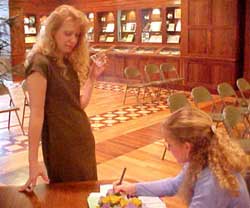
Melany Neilson (standing) is interviewed by Julia Cathcart, SHS student researcher. Photo by Florence Box
I was born in Moses Lake, Washington.
2) When were you born?
December 1, 1958
3) What were your parents’ names?
My parents were Rosemary and Ed Tye.
4) How many brothers and sisters do you have?
I’m the eldest of five children. I have three brothers and one sister.
5) When did you move from Washington and to where?
In 1959, my parents moved back home to Lexington, Mississippi.
6) Where did you go to school?
I went to Benton Public School for three years, and I graduated from Central Holmes Academy.
7) Where did you go to college?
I went to the University of Mississippi in Oxford, Mississippi.
8) What year did you graduate from Ole Miss?
1979, undergraduate school; 1986, graduate school.
9) What was your major?
I have a Bachelor’s of Art in English and a Master’s of Art in Journalism.
10) How did you meet your husband? When? Where?
At a party at Ole Miss, in 1979.
May 18, 1985
12) When were your sons born?
July 25, 1998
13) Who is your favorite author?
It is very hard to choose just one author. Eudora Welty and William Faulkner are my two favorite authors.
14) What is your favorite book by this author?
My favorite story by Eudora Welty is “A Memory; ” and my favorite book by William Faulkner is The Sound and the Fury.
15) When did you want to become a writer?
I did not know whether I could write, but I realized that I wanted to write when I was in the fourth grade.
16) What made you want to become a writer?
My fourth grade teacher, Ms. Maybelle O’Reilly, read us a letter by Emily Dickinson. When she read the line “My eyes are the color of sherry left overnight in the glass,” I gasped. Of course, all the other children laughed at me, but I knew at that moment that I wished I could make others see what I had seen when that line was read.
17) How long did it take you to write The Persia Café?
The first part of the book took a little while, but it took off after that. My favorite part of writing a story is not knowing what is going to happen next, but just knowing that the story is forming and coming together in its own time.
18) Did you have any particular motivation or inspiration to write this story?
I wanted to write about that time just before the civil rights movement, when a certain innocence was passing. I also wanted to write about that time when my parents were young, vital and beautiful.
19) What is your favorite memory from writing this book?
While I was writing, my husband would be at work. As soon as he came home from work, we would pour a glass of wine and sip it as we walked toward the mountains outside our home. We would often discuss what I had written that day and where the story might go next.
20) Do you think that you are similar to Fannie in any way?
I know I have her vulnerability, and quite possibly, her stubbornness.
21) Did you base any of the characters in The Persia Café on people you know?
I’ll never tell!
22) Are you currently writing another book?
Yes, on a story that has its origin in the decade between the publication of my first book and my second one. The reason there was so much time in between Even Mississippi and The Persia Café is that I started struggling to write a book about my father after his death. The story would not come, so I decided to put it down for a while. Then I focused on this book. I am currently about two-thirds of the way through the story my father inspired.
23) Did you base any part of The Persia Café on your memories of life in Mississippi?
Yes. I grew up in a family who knew this emotional closeness and this strict adherence to rules. We also enjoyed good eating and good storytelling, so in this book I decided to try to put the two together.
24) Has your work received any awards or nominations besides the Lillian Smith Award, the Mississippi Authors Award, being named the Gustavas Myers Outstanding Book on Human Rights, and a prestigious Pulitzer Prize nomination?
No. But I was thrilled and astounded to receive these.
25) Who inspires you the most in life?
My husband and children inspire me more than anyone else. If God can send down these two golden-haired angels to me, then I believe anything can happen.
26) Do you have any advice for students today?
Take your time. Don’t rush your decisions about what you want to become. Be happy to be young, and thinking of how, as our friend, Ed Bacon, says, your greatest gift can meet the world’s greatest need.
27) Do you have any advice for writers today?
Good luck.
28) Do you think you will come back to Mississippi some day?
I like living in California, but I have become homesick for the South, and I hope to come back sometime.
Related Websites
- Review of Persia Cafe by Rob Stout in The Denver Post, 2001
- Texas Wesleyan University page for Frederick G. Slabach, husband of Neilson.
- This Amazon site lists Melany Neilson’s two books, and it offers a summary of the books as well as some information about the author.
Bibliography
- Carroll, Mary. American Library Association: 2001.
Http://www.amazon.com/exec/obidos/search-handle-url/index%3Dbooks%26field-author%3DNeilson%2C%20Melany/ref%3Dsim%5Fartist%5Fdetail/107-8804421-0901328. 20 April 2001. - Doubleday Direct Inc. “The Literary Guild.” BOOKSPAN. 2000. 13 April 2001.
- Doubleday Direct Inc. “The Literary Guild.” BOOKSPAN. 2000. 13. April 2001.
- Larson, Deanna. http://www.bookpage.com/0101bp/fiction/persia_cafe.html. 8 April 2001.
- Neilson, Melany. (1) E-mail interview: Fred Slabach” <[email protected]>, 27 April 2001.
- Neilson, Melany. (2) Even Mississippi. Tuscaloosa: University of Alabama Press. 1989.
- Neilson, Melany. (3) Personal interview. 8 March 2001.
- Neilson, Melany. (4) The Persia Café. New York: St. Martin’s Press. 2001.
- O. Rebecca. 28 January 2001. http://www.mail-archive.com/[email protected]/msg06245.html. 9 April 2001.
- Starkville Daily News. “Author to speak, sign books.” 8 March 2001.
- Stennis Center for Public Service and MSU Mitchell Memorial Library. Reception and Book Signing. 8 March 2001.
- The Persia Café. Thomas Dunne books. 2001. http://mln.lib.ma.us:8014/marion/AHI-2650. 21 April 2001.

